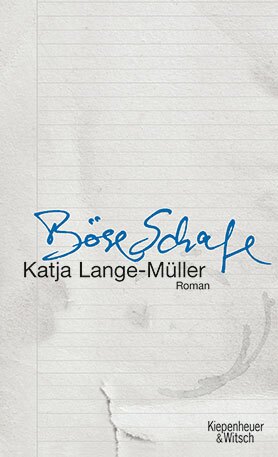Fiction
Katja Lange-Müller
Böse Schafe
[Angry sheep]
This book was showcased during the special focus on Portuguese: Brazil (2007 - 2008).
Review
A lower-class West Berlin milieu just before and after the fall of the Wall 1989; a junkie out on probation, sick with AIDS,; an unemployed woman in her forties who has fled from East Berlin to the other part of the city, getting by with an occasional job as a flower-seller: is this the stuff of a poignant love story? Set at the lower end of society, telling of life on the edge of financial and emotional catastrophe, Katja Lange-Müller’s novel Angry Sheep proves that it can be done – and so outstandingly that the author’s affecting social realist novel quite rightly made the short list of the German Book Prize in fall 2007.
At the start of the new millennium, nearly 20 years later, Soja looks back upon the four years she shared – more or less – with Harry, the drug-addicted ex-con she ran into on the street. From the very first moment, with a striking and disturbing unconditionality, he becomes her raison d’être. Hell-bent on helping Harry in his resocialization, she puts together a group of private caretakers and supports him financially. All in the hopes of preventing him from lapsing back into drug use or the crime that goes along with it.
Soja comes across on the one hand as a selfless helper who attempts to organize the outsider’s life and give him a new stability. On the other hand, however, this relationship stabilizes her as well. He is the first (and, as we later learn, the only) man with whom she experiences love not as a “sickness” of which she is “deathly afraid”, but as a “wantlessness with its promise of freedom” and a “beguilingly undramatic happiness”. At last she has the feeling that she is needed and has a purpose in life, which makes her just as dependent on Harry, in her own way, as he is on his drugs. It is the story of two addicts, told here with unsparing openness, yet great tenderness as well, in a constant search for the right words to describe events difficult to understand. And in Lange-Müller’s novel these include the great historical upheaval marked by the fall of the Wall.
The depressing welfare-milieu of this love (and passion) story is unusual in German contemporary literature, as well as the way in which this amour fou is narrated: in the second person, as Soja’s direct appeal to the lover who, despite all her loving care, relapsed, ultimately dying of AIDS in a hospice in 1990. This inner dialogue with a man who was unfaithful in more than one respect is a rather one-sided exchange, much like their former conversations, and it is still driven by rage and incomprehension at his betrayal of her and her love that bordered on self-sacrifice. At the same time, it is one great declaration of love that transcends death. Ever since their first meeting, Harry has “never left her life”.
Soja’s retrospective confrontation with her lost love is sparked by the sporadic notes, filled with coldness and cynicism, which Harry left behind and which Soja first reads decades after his death. Struggling to grasp the fact that she does not warrant a single mention there, Soja takes a few passages cited in her great parting monologue as a point of departure for one long searching arc, attempting to write her way back to what actually existed or did not exist between them – something which should have been so obvious, but which she was unable or unwilling to see. “I didn’t want to see what, as it soon became clear, I was unable to see, in the sense of I just can’t watch.” As Soja exposes her projections and her wishful thinking, she revolves with increasing urgency around the incomprehensible question: “Why am I missing, as if we’d never met?”
A stocktaking of what bound her and continues to bind her to a person as unreliable as he was childishly lovable, so strongly that to this day he dominates her thoughts and feelings: that is the key motivation behind Soja’s testimonial. And astonishingly enough, this monologue, which gradually turns into a kind of requiem for her lost love, does in fact have a clarifying, even liberating effect on her: “I was about to give myself up before I read your notebook and discovered that I can speak with you, even write to you.” This thoroughly personal form of address, the imaginary dialogue, lends the novel an enormous intensity and urgency and touches the reader more deeply than any other form could have done.
Its powerful literary quality is also reflected in the fact that Soja’s retroactive confrontation with her boyfriend and her own self-interrogation never lapses into kitsch or tear-jerking. This is mainly owing to the unsentimental view the narrator takes of herself. She describes her own weaknesses and longings radically and with flippant directness, even as, with sensitive images, existential gravity and still-tangible passion, she identifies the experience of love as the crucial thing that can never be taken away from her.
In the end Soja’s dialogue with the absent Harry is no less than a Song of Songs in praise of love and the power of memory: “This [slightly faded and scratched] film unreels as soon as I think of you, of us.” In these indelible images, Harry actually lives on inside her. And so, despite all the pain and melancholy it describes, the novel reaches a conciliatory, almost hopeful conclusion: “We have one another and time; nothing else, but plenty of that, even though it no longer seems to exist at all.”
Translated by Isabel Fargo Cole


